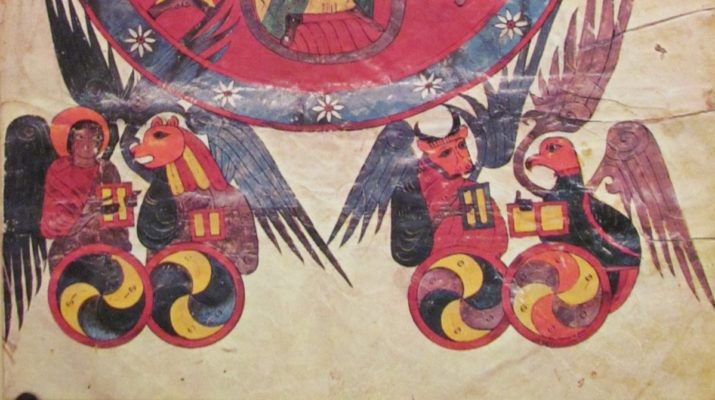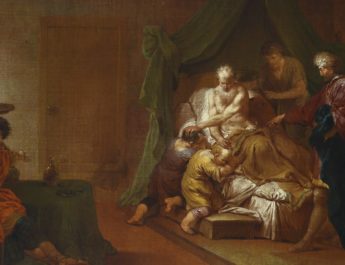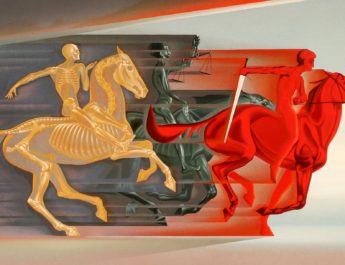Revelation 4:1-11
Narrative Lectionary
1 After this I looked,I and thereII in heavenIII a doorIV stood open!V
I “looked” = horao. To see, perceive, attend to, look upon, experience. Properly, to stare at and so implying clear discernment. This, by extension, would indicate attending to what was seen and learned. This is to see, often with a metaphorical sense. Can include inward spiritual seeing.
II “there” = idou. From eido (to be aware, see, know, re member, appreciate). This is see! Lo! Behold! Look! Used to express surprise and or draw attention to the statement.
III “heaven” = ouranos. May be related to oros (mountain, hill) with the notion of height. This is the air, the sky, the atmosphere, and heaven. It is the sky that is visible and the spiritual heaven where God dwells. Heaven implies happiness, power, and eternity.
IV “door” = thura. This is opening or closure so it’s a door, gate, or entrance. Figuratively, this can refer to an opportunity.
V “stood open” = anoigo. From ana (up, back, again, among, between, anew) + oigo (to open). This is to open in literal or figurative sense.
And the firstVI voice,VII which I had heardVIII speaking to me like a trumpet,IX
VI “first” = protos. From pro (before, first, in front of, earlier). This is what is first, which could be the most important, the first in order, the main one, the chief.
VII “voice” = phone. Probably from phemi (to declare, say, use contrasts in speaking to shed light on one point of view); {from phao (to shine) or phaino (to bring light, cause to appear, shine, become visible or clear). This is a voice, sound, tone or noise. It can also be a language or dialect.
VIII “heard” = akouo. This is hear or listen, but it also means to understand by hearing. This is where the word “acoustics” comes from.
IX “trumpet” = salpigx. 11x in NT. Perhaps from salpizo (to play a trumpet, to sound a trumpet blast literally or figuratively); perhaps from salos (tossing like the waves of the sea; agitation, vibration); perhaps from saino (wag the tail, flatter, beguile, move, shake; figuratively, to disturb); related to seio (to shake, vibrate; figuratively to agitate or show fear). This is a trumpet, bugle, or the sound that a trumpet makes.
said, “Come upX here, and I will showXI you what mustXII take placeXIII after this.”
X “come up” = anabaino. From ana (up, back, among, again, anew) + the same as basis (step, hence foot; a pace); {from baino (to walk, to go)}. This is to come up in a literal or figurative sense – ascent, rise, climb, enter.
XI “show” = deiknumi. This is to show in a literal or figurative sense so it can be to teach, bring, or point out.
XII “must” = dei. From deo (to tie, bind, compel; declare unlawful). This is what is necessary or proper. It is what is needed or what one should do – a duty or something inevitable. This refers to something absolutely necessary.
XIII “take place” = ginomai. This is to come into being, to happen, become, be born. It can be to emerge from one state or condition to another or is coming into being with the sense of movement or growth.
2 At onceXIV I wasXV in the spirit,XVI
XIV “at once” = eutheos. From euthus (immediately, upright, straight and not crooked); {perhaps from eu (good, well, well done, rightly) + tithemi (to place, lay, set, establish)}. This is directly, soon, at once.
XV “was” = ginomai. Same as “take place” in v1. See note XIII above.
XVI “spirit” = pneuma. From pneo (to blow, breath, breathe hard). This is wind, breath, or ghost. A breeze or a blast or air, a breath. Figuratively used for a spirit, the human soul or part of us that is rational. It is also used supernaturally for angels, demons, God, and the Holy Spirit. This is where pneumonia comes from.
and there in heaven stoodXVII a throne,XVIII with one seatedXIX on the throne!
XVII “stood” = keimai. This is to lie, recline, be set, appointed, destined. It is to lie down literally or figuratively.
XVIII “throne” = thronos. Probably from thanos (bench); from thrao (to sit). This is throne or seat – the place where the king sits. So, it is used figuratively to mean power, dominion, or a potentate. This is where the word “throne” comes from.
XIX “seated” = kathemai. From kata (down, against, throughout, among) + hemai (to sit). This is to sit, be enthroned, or reside.
3 And the one seated there looksXX likeXXI, XXII jasperXXIII and carnelian,XXIV
XX “looks” = horasis. Related to “looed” in v1. 4x in NT. From horao (see note I above). This is gazing, appearance, sight.
XXI “like” = homoios. From the same as homou (together); from homos (the same). This is similar to, resembling, like.
XXII {untranslated} = lithos. This is a stone in a literal or figurative sense.
XXIII “jasper” = iaspis. 4x in NT – all in Revelation. Perhaps borrowed from Egyptian OR related to Hebrew yashepheh (jasper or some other gemstone; its root may mean to polish). This is jasper or some other gem. See https://en.wiktionary.org/wiki/%E1%BC%B4%CE%B1%CF%83%CF%80%CE%B9%CF%82#Ancient_Greek
XXIV “carnelian” = sardion. 2x in NT – both in Revelation. From sardeis (Sardis or Lydia); {from Lydian sfard (origin unknown)} + – ion (diminutive). This is a sardian stone, a carnelian. See https://en.wiktionary.org/wiki/%CF%83%CE%AC%CF%81%CE%B4%CE%B9%CE%BF%CE%BD
and aroundXXV the throne is a rainbowXXVI that looks like an emerald.XXVII
XXV “around” = kuklothen. 3x in NT. From the same as kukloi (circle, ring, surrounding); from kuklos (circle, cycle); related to kulioo (to roll, wallow); from kulindo (to roll, roll along); from kuma (wave, billow, curve, bend); from kuo (to swell as one pregnant). This is round about, all around.
XXVI “rainbow” = iris. 2x in NT – both in Revelation. Perhaps from ereo (to say, tell, call, speak of); from Proto-Indo-European *weh₁i-ro- (thread, cord); from *weh₁i- (twist, weave). This is a rainbow or halo. It is where the word “iris” comes from. See https://en.wiktionary.org/wiki/iris
XXVII “emerald” = smaragdinos. 1x in NT. From smaragdos (an emerald or other green precious stone). This is related to emerald, made from emerald, or sharing its color.
4 Around the throne are twenty-fourXXVIII thrones, and seated on the thrones are twenty-four elders,XXIX dressedXXX in whiteXXXI robes,XXXII
XXVIII “four” = tessares. This is four – used figuratively for total coverage.
XXIX “elders” = presbuteros. From presbus (old man). This is an elder as one of the Sanhedrin and also in the Christian assembly in the early church.
XXX “dressed” = periballo. From peri (about, concerning, all around, encompassing) + ballo (to throw, cast, place, put, drop). This is to thrown around, clothe, array, put on.
XXXI “white” = leukos. Related to luke (light). This is bright, white, or brilliant.
XXXII “robes” = himation. From heima (garment) OR from ennumi (to put on). This is the outer garment, cloak, robe, or mantle. It is worn loosely over a tunic.
with goldenXXXIII crownsXXXIV on their heads.XXXV
XXXIII “golden” = chrusous. 18x in NT. From chrusos (gold or something made of gold; symbolic of purchasing power); perhaps from chraomai (to use, make use of, give what is needed, act in a specific way, request). This is related to gold, golden. It could be decorated with or made from gold.
XXXIV “crowns” = stephanos. 18x in NT. From stepho (to twine, encircle). This is something that surrounds i.e. a crown or garland. Properly, this refers to the wreath or garland that the winner of athletic games would win. It symbolized victory and honor from skill as contrasted with a royal crown, which is diadema in Greek. This is the word used for the crown that the saints in heaven wear.
XXXV “heads” = kephale. This is head or chief. It can be a literal head or, figuratively, a ruler or lord. It can also refer to a corner stone. This is where the word “cephalic” comes from.
5 ComingXXXVI from the throne are flashes of lightning,XXXVII and rumblingsXXXVIII and peals of thunder,XXXIX
XXXVI “coming” = ekporeuomai. From ek (from, from out of) + poreuomai (to go, travel, journey, die; refers to transporting things from one place to another; focuses on the personal significance of the destination); {from poros (passageway)}. This is to go forth, depart from, be spoken, flow out, project. This word emphasizes the result a process or passage – how it impacts the person or thing.
XXXVII “flashes of lightning” = astrape. 9x in NT. From astrapto (to flash with or like lightning, be dazzling); probably from aster (star literally or figuratively); probably from stronnumi or stronnuo (to spread, make a bed). This is lightning, brightness, glare, or ray.
XXXVIII “rumblings” = phone. Same as “voice” in v1. See note VII above.
XXXIX “peals of thunder” = bronte. 12x in NT. Related to bremo (to roar). This is thunder. It’s part of the root of brontosaurus, literally thunder lizard. This is also where the last name Brontё comes from.
and in front ofXL the throne burnXLI sevenXLII flamingXLIII torches,XLIV which are the seven spirits of God;XLV
XL “in front of” = enopios. Related to “looked” in v1 & “looks” in v3. From en (in, on, at, by, with) + ops (eye, face); {from optanomai (to appear, be seen); from horao (see note I above)}. This is literally “in sight of.” It is in front of or before in a literal or figurative since.
XLI “burn” = kaio. 11x in NT. This is to kindle, light, blaze. It is light in a literal or figurative sense.
XLII “seven” = hepta. This is seven or seventh. Figuratively, seven is the number of completeness or perfection.
XLIII “flaming” = pur. This is fire, lightning, heat from the sun. Figuratively, it can refer to strife or trials.
XLIV “torches” = lampas. 9x in NT. From lampo (to give light literally or figuratively). This is a torch or lantern that was handheld, perhaps made of clay with a flax wick and oil.
XLV “God” = Theos. From Proto-Indo-European origins, meaning do, put, place. This is God or a god in general.
6 and in front of the throne there is something like a seaXLVI of glass,XLVII like crystal.XLVIII
XLVI “sea” = thalassa. Perhaps from hals (sea, salt, a boy of saltwater) or halas (salt; can be figurative for prudence). This is the sea, a lake, or seashore.
XLVII “of glass” = hualinos. 3x in NT – all in Revelation. From hualos (glass or crystal; a stone that is transparent); perhaps from the same as huetos (rain); from huo (to rain). This is glassy or transparent.
XLVIII “crystal” = krustallos. 2x in NT. From kruos (frost). This is literally ice, which is figuratively used to refer to crystal. It is where the word “crystal” comes from.
AroundXLIX the throne, and on each sideL of the throne, are four living creatures,LI
XLIX “around” = en + mesos. Literally “in the midst of.” Mesos is perhaps from meta (with among, behind, beyond; implies a change following contact or action). This is middle, among, center.
L “on each side” = kuklo. Related to “around” in v3. 8x in NT. From kuklos (see note XXV above). This is in a circle, around.
LI “living creatures” = zoon. From zao (to live literally or figuratively). This is literally a thing that is alive. So, it is an animal or living creature.
full ofLII eyesLIII in frontLIV and behind:LV
LII “full of” = gemo. 11x in NT. This is to be full, swell, at capacity, actions taken to fulfill a goal.
LIII “eyes” = ophthalmos. Related to “looked” in v1 & “looks” in v3 & “in front of” in v5. From optanomai (see note XL above). This is eye or sight. It is used figuratively for the mind’s eye, a vision, or for envy.
LIV “in front” = emprosthen. From en (in, on, at, by, with) + pros (at, to, toward, with). This is before, against, in the sight of. It can be physically in front of or temporally beforehand. It can be literal or figurative.
LV “behind” = opisthen. 7x in NT. Probably from opis (back). This is behind, at the back, after.
7 the first living creature like a lion,LVI the secondLVII living creature like an ox,LVIII
LVI “lion” = leon. 9x in NT. This is lion, which is where our word “lion” comes from.
LVII “second” = deuteros. From duo (two, both). This is second, twice, again. It is part of where “Deuteronomy” comes from, which means “second law” or “a repetition of the law.” Seehttps://en.wiktionary.org/wiki/Deuteronomy
LVIII “ox” = moschos. 6x in NT. This is a young cow of either sex or young shoot.
the thirdLIX living creature withLX a faceLXI like a humanLXII face,
LIX “third” = tritos. From treis (three). This is third.
LX “with” = echo. Literally “having.”
LXI “face” = prosopon. Related to “looked” in v1 & “looks” in v3 & “in front of” in v5 & “eyes” in v6. From pros (at, towards, with) + ops (eye, face) {from optanomai (see note XL above)}. This is the face, surface, or front. It can imply presence more generally.
LXII “human” = anthropos. Related to “looked” in v1 & “looks” in v3 & “in front of” in v5 & “eyes” in v6 & “face” in v7. Probably from aner (man, male, husband) + ops (eye, face); {from optanomai (see note XL above)}. This is human, humankind. Used for all genders.
and the fourthLXIII living creature like a flyingLXIV eagle.LXV
LXIII “fourth” = tetartos. Related to “four” in v4. 10x in NT. From tessares (see note XXVIII above). This is fourth or a quarter. Figuratively, it is a large amount – a totality that is not everything.
LXIV “flying” = petomai. This is to fly.
LXV “eagle” = aetos. 5x in NT. Perhaps from the same as aer (air that we breathe); from aemi (to breathe or blow). This is eagle or vulture. It could also refer more generally to a bird of prey.
8 And the four living creatures, eachLXVI of them withLXVII sixLXVIII wings,LXIX are full of eyes all around and inside.
LXVI “each” = heis + kata + heis. Literally, “one for one.” Heis is one, only, some.
LXVII “with” = echo. Literally “having.” Same as “with” in v7. See note LX above.
LXVIII “six” = hex. 13x in NT. This is six. It is part of where “hexagon” comes from.
LXIX “wings” = pterux. Related to “flying” in v7. 5x in NT. From pteron (feather, wing); from petomai (see note LXIV above). This is a wing or pinion. It is also part of the root of “pterodactyl,” which is literally “wing finger.” See https://en.wiktionary.org/wiki/pterodactyl
DayLXX and nightLXXI without ceasingLXXII they sing,
LXX “day” = hemera. Related to “seated” in v2. Perhaps from hemai (see note XIX above). This is day.
LXXI “night” = nux. This is night or at night in a literal or figurative sense.
LXXII “ceasing” = anapausis + ou + echo. Literally “not having rest.” Anapausis is 5x in NT– including “you will find rest for your souls” from Matthew 11:29. From anapauo (a break from work, which implies being refreshed; denotes that rest that one gets once a necessary task is finished); {from ana (up, again, back, among, between, anew) + pauo (to stop, refrain, pause, restrain, quit, come to an end)}. This is an intermission, refreshment, recreation, rest from work. It can also refer to inner tranquility.
“Holy,LXXIII holy, holy,
the LordLXXIV God the Almighty,LXXV
who was and is and is to come.”
LXXIII “holy” = hagios. From hagnos (holy, sacred, pure ethically, ritually, or ceremonially; prepared for worship, chaste, unadulterated, pure to the core; undefiled by sin; figurative for innocent, modest, perfect). God is totally different from humanity and thus set apart. That which is consecrated to worship God (elements of worship) or to serve God (as the saints) are holy because they are now set apart for God’s purposes. Holy because important to God. This is sacred physically, pure. It can be morally blameless or ceremonially consecrated.
LXXIV “Lord” = Kurios. From kuros (authority, supremacy). This is a respectful address meaning master or sir. It refers to one who has control or power greater than one’s own. So, it was also applied to God and Jesus as Master or Lord.
LXXV “Almighty” = Pantokrator. 10x in NT – 9x in Revelation. From pas (all, every, each) + krateo (being strong or mighty so, by extension, to prevail or rule; to seize, grasp hold of, control; to arrest); {from kratos (strength, power, dominion; vigor in a literal or figurative sense; power that is exercised)}. This is almighty or omnipotent. It is the one who rules everything. It is always used of God.
9 And whenever the living creatures giveLXXVI gloryLXXVII and honorLXXVIII
LXXVI “give” = didomi. To give, offer, place, bestow, deliver. This is give in a literal or figurative sense.
LXXVII “glory” = doxa. From dokeo (to have an opinion, seem, appear, suppose; a personal judgment; to think); from dokos (opinion). This is literally something that evokes a good opinion – something that connects to our understanding of intrinsic worth. The ultimate expression of this is, of course, God and God’s manifestation. So, this is opinion, honor, and dignity, but also praise, glory, renown, and worship.
LXXVIII “honor” = time. From tino (to pay, be punished, pay a penalty or fine because of a crime); from tio (to pay respect, value). This has to do with worth or something’s perceived value. Literally, it means price, but figuratively, it means the honor or value one sees in someone or something else. It can be esteem or dignity. It can also mean precious or valuables.
and thanksLXXIX to the one who is seated on the throne, who livesLXXX forever and ever,LXXXI
LXXIX “thanks” = eucharistia. Related to “at once” in v2. 15x in NT. From eucharistos (thankful, well favored); {from eu (see note XIV above) + charis (grace, kindness, favor, gratitude, thanks; being inclined to or favorable towards – leaning towards someone to share some good or benefit; literal, figurative, or spiritual; grace as abstract concept, manner, or action); {from chairo (to rejoice, be glad or cheerful; a greeting); from char– (to extend favor, lean towards, be inclined to be favorable towards)}}. This is thankfulness or thanksgiving. It is active gratitude. It is related to the word “eucharist.”
LXXX “lives” = zao. Related to “living creatures” in v6. See note LI above.
LXXXI “forever and ever” = eis + ho + aion + ho + aion. Literally “to the ages of the ages.” Aion is from the same as aei (ever, always, unceasingly, perpetually; on every occasion). This is an age, cycle of time, course, continued duration. It is also used to describe the eternal or forever. This is the word used to discuss the present age or the messianic age.
10 the twenty-four elders fallLXXXII beforeLXXXIII the one who is seated on the throne and worshipLXXXIV the one who lives forever and ever; they castLXXXV their crowns before the throne, singing,
LXXXII “fall” = pipto. This is to fall in a literal or figurative sense.
LXXXIII “before” = enopios. Same as “in front of” in v5. See note XL above.
LXXXIV “worship” = proskuneo. From pros (advantageous for, at, to, toward, with) + kuneo (to kiss); {may be related to kuno (dog)}. This is to do reverence, kneel, to prostrate oneself in homage, to worship.
LXXXV “cast” = ballo. Related to “dressed” in v4. See note XXX above.
11 “You are worthy,LXXXVI our Lord and God,
to receiveLXXXVII glory and honor and power,LXXXVIII
for you createdLXXXIX all things,
and by your willXC they existed and were created.”
LXXXVI “worthy” = axios. From ago (to lead, bring, carry, guide, drive, go). This is related to weight or worth – deserving, suitable, corresponding, due reward.
LXXXVII “receive” = lambano. It does not refer to passive receiving of something, but active acceptance or taking of something whether it is offered or simply nearby. It focuses on individual decision and action.
LXXXVIII “power” = dunamis. From dunamai (to be able, have power or ability). This is might, strength, physical power, efficacy, energy, and miraculous power. It is force literally or figuratively – the power of a miracle or the miracle itself.
LXXXIX “created” = ktizo. 15x in NT. Probably akin to ktaomai (to get, purchase, possess). This is to build, create, form, shape. It refers to God’s acts of creation.
XC “will” = thelema. From thelo (to desire, wise, will, intend). This is the act of will, choice, purpose, or decree.
Image credit: “Manuscript of the Moralia in Job by Gregory the Great, composed by Florentius at the monastery of Valeranica. Christ in Majesty,” circa 945.




